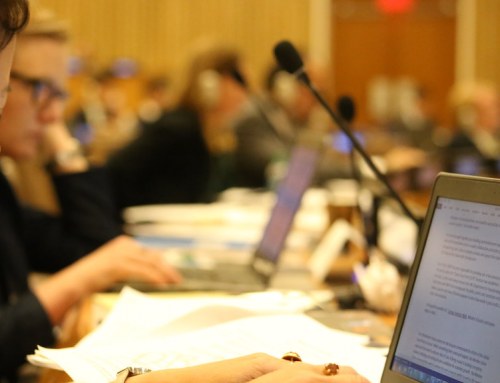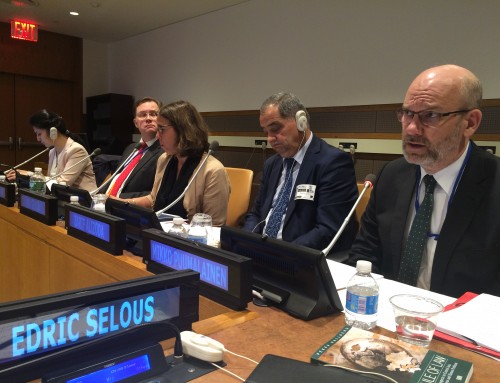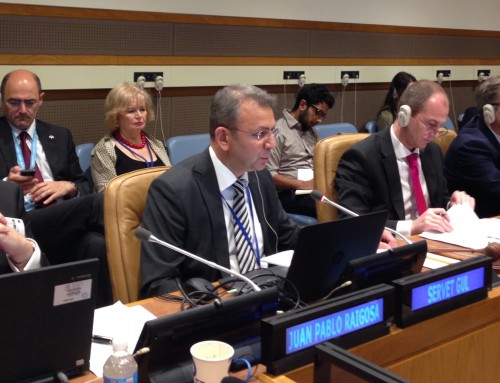The Permanent Missions of Brazil, Cote d’Ivoire and Hungary to the United Nations, and UNICEF and the Rule of Law Unit on behalf of the UN Rule of Law Coordination and Resource (RoLCRG), organised a panel discussion on “Birth Registration: Passport to Protection” in New York on Thursday, 21 May 2015.
The event provided an opportunity for Member States, UN entities and civil society to exchange knowledge, experiences and best practices on achieving universal birth registration. It also provided an opportunity to discuss and hear about progress on the implementation of the voluntary pledges on the rule of law, made on the occasion of the High-level Meeting of the General Assembly on the Rule of Law at the National and International Levels in September 2012.
A number of key themes emerged from the event. First, that birth registration is vital to ensuring that all individuals are equal before the law, can claim their rights and access the justice system, as well as other basic services such as health and education. Birth registration is therefore fundamental both to the rule of law and sustainable development. Panellists re-emphasised that “the need to ensure legal identity for all through birth registration” has been set out as a target under the Goal 16 of the proposed Sustainable Development Goals (SDGs). This target, as well as several other targets under Goal 16, is not only important in itself, but also an enabler and driver of other Sustainable Development Goals. Goal 16 and the target of universal birth registration are fundamental to ensure that the calls to leave no one behind and protect the most vulnerable are heeded in the Post-2015 Agenda.
The presentations tackled challenges to universal birth registration which include geographical, financial and logistical barriers, as well as population size and lack of awareness of the importance of birth registration. Innovative solutions to these challenges were discussed, including a focus on ensuring that birth registration was free and accessible, and that the State catered to the situations and needs of its populations, including the most vulnerable and hardest to reach. Panellists addressed the importance of integrating the system of birth registration with a system of vital statistics, and link with other registers and processes necessary to access basic social and economic services. It was highlighted that birth registration is vital for good governance as it provides crucial data and statistics for Governmental planning, implementation and evaluation of policies.
Mr. Edric Selous, Director of the Rule of Law Unit in the Executive Office of the Secretary-General opened the event by emphasising the fundamental nature of birth registration to the rule of law and human rights. Mr. Selous noted the topical importance of the discussion in light of the General Assembly’s current considerations of the rule of law and sustainable development within the context of the post-2015 development agenda. He reminded the participants that Goal 16 contains a target of universal birth registration.
Mr. Selous thanked Brazil, Cote D’Ivoire and Hungary for stepping forward to share their national practices aimed at improving birth registration. The diverse situations of Member States mean that their challenges and solutions vary depending on the context. The sharing of ideas, experiences and information on platforms such as that provided by the event is essential for innovative and practical solutions to achieving universal birth registration and strengthening the rule of law. Mr. Selous also noted that the event provided an opportunity for Hungary to share their experiences and lessons learnt in implementing the voluntary pledge Hungary had made on the occasion of the High-Level Meeting on the Rule of Law in 2012.
H.E. Ambassador Zsolt Hetesy , Deputy Permanent Representative of Hungary to the United Nations spoke about the importance of legal identity and birth registration in the context of the Sustainable Development Agenda, as well as about the implementation of Hungary’s 2012 pledge to reform birth registration procedures.
Ambassador Hetesy outlined that the target of universal birth registration in Goal 16 of the SDG’s is one of the drivers and cross cutting targets of the agenda. He highlighted that without legal identity, an individual is left out from all three dimensions of development (economic, social and environmental) and all of the 17 Goals. Birth registration is pivotal to access to services, opportunities and inclusive development. In particular, he drew on his interactions with activists and entrepreneurs in his former capacity as Vice-President of the High-level Committee on South-South Cooperation to point out that birth registration is important for the realization of economic participation, and building on that, for political rights. It is essential to access education and work opportunities, to open a bank account, to register businesses, access loans and financial credits, as well as to own property. The lack of birth registration therefore compounds the vulnerability of those who are already most vulnerable in society. Ambassador Hetesy also emphasised that birth registration is crucial for improving the Government’s data on vital statistics, and for planning at the national level.
Ambassador Hetesy discussed the implementation of Hungary’s pledge “to simplify administrative procedures regarding birth registration and civil records”, made on the occasion of the High Level Meeting of the Rule of Law in 2012. To fulfil this goal Hungary had switched to a fully digitalised and centralised system of registration, trained registrars, and employed IT-systems to simplify registration procedures and records.
The aim of the Government of Hungary is to ensure that every live birth in Hungary is registered. Some steps taken to that end include placing the primary onus to ensure registration on the director and staff members of medical institutions where the birth takes place, reducing the burden on parents. Hungary had also created the tool of “fictitious Parent” to allow children with unknown parents to be registered, and integrated the registration of birth to the processes of obtaining other documentation such as ID Cards, passports, social security and tax cards. As a result of these steps, the last case of an unregistered birth in Hungary had been a single occurrence in 2008. Ambassador Hetesy concluded by stating that some of Hungary’s key goals for the future included transferring all existing information on the paper based registers onto digital registers and combining the different forms of identification into one identification card.
Mr. Sérgio Rodrigues , Minister Plenipotentiary at the Permanent Mission of Brazil to the United Nations opened by emphasising that Brazil attaches great priority to the issue of birth registration as an essential step for an individual’s full enjoyment of human rights and full exercise of citizenship. Mr. Rodrigues recalled that, in addition to being an important target in itself, universal birth registration is crucial for ensuring access to justice for all. He recalled that, at some points of the discussions on the SDGs, there were conflicting views on the incorporation of a security perspective into a global sustainable development agenda. Each country needs to come to terms with its own situation, history and challenges, ensuring national ownership and policy space. Mr. Rodrigues noted that, in the context of a sustainable development agenda, an approach based on “access to justice” captures the dynamic dimension of the rule of law, in so far as it allows for consideration of the multiple dimensions of vulnerabilities and injustices, providing a broad platform for a rights-based, socially inclusive set of goals and targets.
There had been consensus in the Open Working on the SDGs that there should be a no “one-size fits all approach” to implementing the target of birth registration within the Goal 16. Mr. Rodrigues shared lessons learnt from Brazil’s national experiences in working towards achieving universal birth registration, highlighting the complexities faced by a country with a large landmass and a population of over 200 million. To reach the rural and homeless populations, as well as the indigenous peoples and the “quilombola” communities (originally formed by Brazilians of African descent fleeing slavery), it has proved crucial to make birth registration free. Brazil is employing tactics such as active searches, use of census data, targeted questions during annual national household surveys, and training and capacity building of registrars. Having registrars travel to people in remote locations where non-registered individuals might be has shifted costs away from individuals to the State. Brazil has also made it possible to allow for single mothers to register their children without requiring the name of the father. As a result of these combined efforts, Brazil dropped the percentage of non-registered births from 20.2 in 2002 to 5.1% in 2013. Mr. Rodrigues also recognised that much remains to be done and emphasized increasing the number of registry offices in health facilities and better using the data collected during this process for improving implementation of Government planning, policy and statistics in all areas.
H.E. Ambassador Bafetigue Ouattara , Deputy Permanent Representative of Côte d’Ivoire to the United Nations opened his remarks by noting that birth registration is a fundamental human right and that exchanging experiences on the topic is of importance to countries like Côte d’Ivoire, where only one in three births is currently being registered. This leaves half a million children unregistered every year, despite registration being obligatory by Ivorian law. The situation in Côte d’Ivoire had been further aggravated because of the 2002-2011 crisis in the country. In recent years, the Government has taken exceptional measures to register the children who were left unregistered during the crisis. Legislation has been presented aimed at modernizing the civil registry and special hearings have been organised throughout the country to allow for children up to the age of 13 to be registered. The efforts have been critical not only in the context of overall development, but also for the electoral process in 2011.
Ambassador Ouattara emphasized the key role played by civil society organisations in supporting and complementing the Government’s efforts. It has proven important, like in the case of Brazil, to reach out to meet people where they already are, and to remove institutional obstacles to registration. Innovative methods were being used, such as community-based declarations of birth and more recently declaration or full registration of birth via SMS. Ambassador Ouattara noted that awareness-raising was critical and one of the priorities of the Ivorian Government in moving forward, together with digitalisation of the civil registries.
Ms. Lori Heninger , Head of New York Office, Plan International, commended the steps that Member States had taken to achieve universal birth registration. She reiterated that one of the key themes that had emerged was making the registration process easy, simple, accessible and free.
Ms. Heninger outlined the multitude of problems which people face if they are not registered. Children often can’t attend school without a birth certificate, healthcare and social security entitlements are unavailable, and they can’t obtain passports. The problem is particularly severe for refugees and stateless persons. In addition, protection of children from labour, forcible conscription in conflicts, child marriage, sexual exploitation and trafficking are all contingent on knowing the child’s age. Further, unless the age of the child is known the child cannot be treated as a child for the purposes of the criminal justice system. Ms. Heninger then emphasised that birth registration and the right to identity is included and well established within the international legal framework. She stated that Plan International in its ‘Count Every Child’ programme has been working to achieve universal birth registration resulting in the registration of over 40 million people.
Ms. Heninger noted that challenges to achieving universal birth registration include absence of clear global leadership, lack of adequate international support, lack of political will and difficulties in coordinating between government ministries, as well as lack of financial, technological and human capacity, geographical barriers, lack of awareness about the importance of birth registration, and burdensome and costly registration processes. Furthermore, difficulties in the registration process which adequately fail to take into account social realities and cultural norms, fear of persecution and discrimination as a result of registration also play a role. To achieve the target of universal birth registration, greater political will for the global establishment of culturally appropriate birth registration systems, co-ordination between different Governmental departments and institutions at the national level, funding for capacity development and infrastructure, campaigns at the national, regional and local level to raise awareness of the importance of birth registration and ensuring that the registration systems are safe and confidential are needed.
Ms. Susan Bissel , Director, Child Protection, UNICEF moderated the event. Throughout the course of the discussion and in her concluding remarks she emphasised that universal birth registration is one of the key priorities for UNICEF in UNICEF’s new strategic plan and that UNICEF is playing a leadership role in ensuring the success of universal birth registration. She also emphasised that as well as birth registration being the passport to rights protection, it is ‘a breeder’ for other important State documentation. Birth registration gives Governments crucial data and statistics necessary to effectively plan, as well as implement policy and evaluate its impacts.
Ms. Bissel reminded the participants that a lot remains to be done to achieve the target of universal birth registration. 230 million children under 5 years of age are unregistered. In addition, progress on this front has to be accelerated to keep up with the acceleration in population growth. Nevertheless, universal birth registration is one of the most achievable targets of the proposed SDGs. Birth registration has to be free of charge, universal, confidential and part of the civil registration system.
Discussion
An informal exchange of experiences and a lively question and answer session followed the panel discussion. Some of the questions raised included the role that civil society could play in the process of universal birth registration; what methods could be used to build multisectoral coordination in working towards universal birth registration; what mechanisms could be used to hold Governments accountable in achieving their targets; creative measures which could be taken to raise public awareness about birth registration including awareness in children; and the further steps that UN agencies including the statistics division of the UN could take to facilitate this process.
Furthermore, Ms. Anki Eriksson, Deputy Director of the New York Office of UNHCR outlined the specific importance of birth registration to refugees and internally displaced people, and as a protection against statelessness. She emphasised that despite the challenges, universal birth registration which ensures that no individual is left stateless and every individual is accorded rights can be achieved. She gave examples of innovative good practices to this end which include the production of animated videos in Jordan to promote awareness; mobile registration teams in Liberia; and a door to door registration campaign in Niger and Columbia. Ms. Eriksson emphasised the importance of registering all people (adults and children) who have not been registered so far – irrespective of their age.




